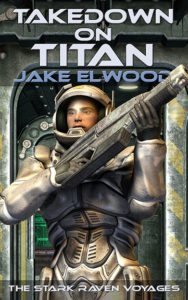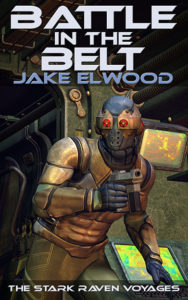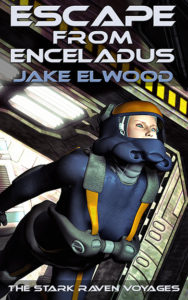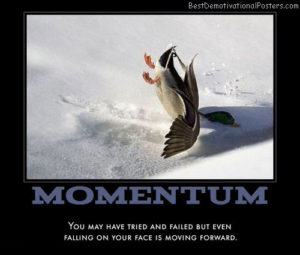I was part way into the book ad things seemed to be going well. The story was coming together. My protagonist was active. He was in a tree and I kept throwing rocks at him. Somewhere, somehow, he had to muster the strength that would make him stop being on the defensive and get on the offensive.
Then my protagonist and I hit the proverbial brick wall. Ouch! All the momentum I had, the three thousand plus words I wrote every day stopped. My brain became a repository of mush, not great ideas. My energy was but a whisper of a breeze unable to flutter a tiny leaf.
I had to figure this out.
What had I done to prepare?
- I had done some planning. I knew the character, the climax, the villain and where I wanted the story to be by the end.
- Distractions were minimal. I had the hours I needed every day to write.
- My chair was comfortable. (sounds lame I know but those Excuse Gremlins can be weird at times)
The problem: the momentum was gone.
I was still certain I had a good story and I wanted to write it, but what was wrong?
I was a few chapters in so I did a chapter by chapter outline. The progression seemed logical enough. But, I found a niggle, the tiniest one. Why would my character have acted this way? Actually, the question needed to be reframed: what motivated him to do this? He is trying to tell me something, something I hadn’t realized in my initial thoughts about him.
It was time to re-examine my protagonist, to ask him more questions, to delve deeper into his background and the society in which he lived. It was then that I discovered that his father had instilled in him values I hadn’t been fully aware of. From those values came his struggle. What he had grown up to believe wasn’t holding true. So, now he had conflict and I the writer, had theme.
I went back over those first chapters, re-examined them in the context of the theme, his inner struggle and discovered that although I had an okay plot, the protagonist’s struggle wasn’t being reflected in some scenes and it didn’t serve to motivate him to act or not act in situations.
Aha! moment in hand, I rewrote those scens, thought through the novel once more.
The take away? My writing momentum stopped because I didn’t have enough knowledge about my protagonist to proceed. For me, knowing what’s at stake, what my character’s inner conflict is, what motivates him at the core, drives my story telling. Knowing this speaks to theme and helps create a stronger villain. In other words, the rocks I’m throwing up the tree are a lot bigger and hurt a lot more. Knowing the character’s inner conflict also helps create better secondary characters: some who enable, others who derail, and others who hold the mirror of truth.
With deeper understanding and greater potential for conflict realized, my writing momentum returned.
My advice:
1)When momentum lags, re-examine your protagonist and maybe the villain too. Find what excites and moves them and most importantly, what their deepest conflicts and influences are.
2) Determine what your story is about (aka the theme). If you know that, then your characters are the instruments to explore that theme with all its inherent conflicts and consequences. If you’re having trouble figuring out your theme, then re-examine key characters deeper still.
If you’re having trouble maintaining your momentum, stop wrting and take a moment to think about what motivates the protagonist and what his inner conflicts are. Look at theme too for understanding that will keep the story from being derailed as all scenes and characters will somehow speak to it. And, you never know, maybe your subconscious was trying to tell you something about another story problem which you aren’t yet consciously aware of. Stopping, and taking a bit of time to reflect, will not only help you to regain your momentum, but to also keep it.





 Have you ever had someone toss you a watermelon? The big ones are tough to catch because they can slip out of your hands due to momentum. Similarly, finishing a writing project and holding a copy in your hand is always a good feeling that’s tough to hang on to when you have to figure out what to write next, but what about the momentum of that event?
Have you ever had someone toss you a watermelon? The big ones are tough to catch because they can slip out of your hands due to momentum. Similarly, finishing a writing project and holding a copy in your hand is always a good feeling that’s tough to hang on to when you have to figure out what to write next, but what about the momentum of that event? Each book is a stepping stone to your writing world. If you only write one and spend your days flogging it, after a while people will almost look at you like you’re a spammer. Same thing, day after day after month after year. If you started working on the next book, after a year you’d have at least one close to finished. Some folks can have four quality books or more. Author Chris Fox has a video series where he is writing a science fiction trilogy in exactly twelve weeks. You get to see weekly updates. Last year he wrote a novel in 21 days, then turned around and pulled in a six-digit income by December 31st. All of this was documented on
Each book is a stepping stone to your writing world. If you only write one and spend your days flogging it, after a while people will almost look at you like you’re a spammer. Same thing, day after day after month after year. If you started working on the next book, after a year you’d have at least one close to finished. Some folks can have four quality books or more. Author Chris Fox has a video series where he is writing a science fiction trilogy in exactly twelve weeks. You get to see weekly updates. Last year he wrote a novel in 21 days, then turned around and pulled in a six-digit income by December 31st. All of this was documented on 